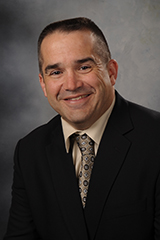September 17, 2019
When Values and Research Collide…

Extension professionals and volunteers are proud to say we provide research-based information and education. Nevertheless, there are times when the prevailing research is inconveniently pointing to decisions and outcomes that are at odds with our personal beliefs and values or the personal values and beliefs of others. What’s an Extension professional or volunteer to do when faced with this situation?
I will be the first to admit that this is a difficult dilemma from an individual perspective. We all have beliefs and values that have been shaped by our families, friends, communities, cultures, careers, political affiliations, religious and philosophical perspectives, and other life experiences. We hold each of our values and beliefs dear. The answer to the dilemma is easier from an institutional perspective. K-State Research and Extension has hundreds of Extension professionals and thousands of volunteers. Each of us has a unique set of values and beliefs. If we use our individual values and beliefs to guide our programmatic decision making and advising, the resulting themes emanating from K-State Research and Extension efforts will be numerous, varied, potentially conflicting, and, from the perspective of the people we serve, confusing.
If our educational programs and advice are based on research generated by sound research practices, we have a more unified voice. Such a voice is more easily understood, defendable, and less confusing for the people we serve.
Does that mean we cannot question the research we use? We can and should question the research we use. Asking critical and clarifying questions is a major component of any scientific inquiry or dissemination. It helps us to vet research, determine robustness, and opens the door for important follow-up research. What we cannot do is disregard research that doesn’t support or align with our values and belief or those of our external stakeholders.
Does that mean that we, as private citizens, have to adopt all of the practices that our research suggests? No. I would bet that each of us has said something like the following at some time in our life, “I know what the research says about ________, but I am going to do _______ instead due to my beliefs and values.”
I am going to make an educated guess that Chick-fil-A’s Dan Cathy has been exposed to sound research that shows how much the company’s closed-on-Sundays policy reduces their profit. That projected financial loss doesn’t matter to Cathy. The Cathy family values family time more. Nevertheless, research still plays a role here. It enables the company to make a more informed value-based decision as it shows how much the policy costs the company.
What if the prevailing research is not complementary to a particular sector or stakeholder group? Decision makers want to know about research that affects them, both good and bad. In fact, when we do Extension listening sessions, focus groups, exit interviews and other methods of information gathering – I am often most interested to find out about opportunities for improvement. It does not do me or us any good to only hear good things. That leads to complacency.
It is true that external stakeholder groups may want to talk to us about what they perceive as uncomplimentary research. When that happens, we have and will sit down and discuss the issue with them. Yes, they may initially be upset with us. Long term, however, they can become stronger by taking the opportunity to improve in the area the research questioned.
We cannot and will not sweep controversial but sound research under the rug. Doing so takes on an unhealthy form of advocacy that is the antithesis of the implied duties of our Land Grant mission. Sweeping controversial but sound research under the rug also sets a horrible precedent. If we do that for one mad stakeholder or stakeholder groups, we have to do it for all stakeholders. We cannot and will not open that Pandora’s box. Doing so will erode our relevance and the public’s trust in us. We will always use sound research to educate and advise the people we serve, no matter how controversial or unpopular that message is.